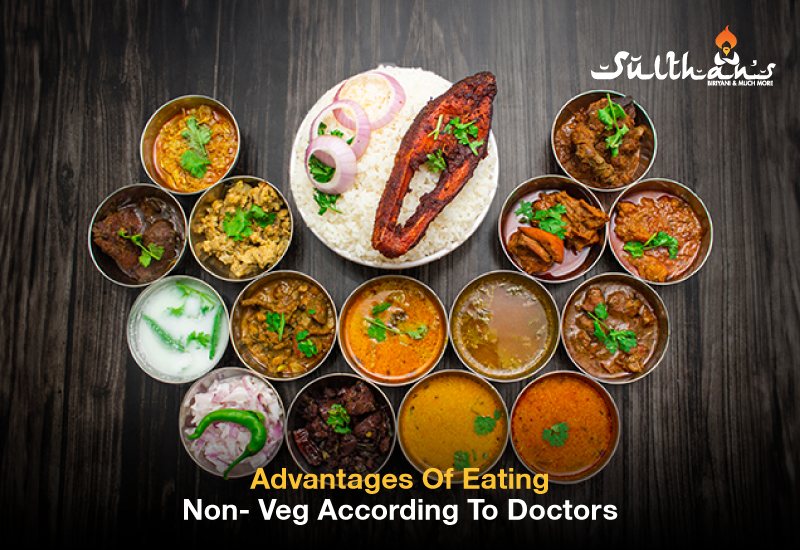Introduction
Non-vegetarian foods have played a vital role in human diets for centuries, offering a rich source of essential nutrients that can be harder to obtain from plant-based sources alone.
These foods provide high-quality protein, heme iron, omega-3 fatty acids, vitamin B12, and other vital nutrients that support various bodily functions. Incorporating non-vegetarian foods into your diet can lead to improved muscle growth, stronger bones, enhanced immune function, and better mental health.
However, it’s important to consume these foods responsibly, considering ethical and environmental factors, and in moderation to maintain a balanced diet. Understanding the health benefits of non-vegetarian foods can empower individuals to make informed choices that support their overall well-being.
Here’s a detailed look at ten advantages of eating non veg foods into your diet:

ALSO CHECK – Health Benefits Of Whole Spices In Your Biryani
1. Rich Source of High-Quality Protein – Advantages of eating non veg
Non-vegetarian foods, such as meat, poultry, and fish, are excellent sources of high-quality protein. These proteins contain all the essential amino acids your body needs for muscle repair, growth, and overall function. Protein is also crucial for maintaining healthy skin, hair, and nails.
2. Iron Absorption
Animal products are rich in heme iron, which is more easily absorbed by the body than non-heme iron found in plant sources. This makes non-veg foods particularly beneficial in preventing and treating iron deficiency anaemia, a common condition that can lead to fatigue, weakness and compromised immune function.
3. Omega-3 Fatty Acids
Fatty fish like salmon, mackerel, and sardines are abundant in omega-3 fatty acids, which are essential for heart health and brain function and reduce inflammation in the body. Omega-3s have been linked to a lower risk of heart disease, stroke, and cognitive decline.
4. Vitamin B12
Vitamin B12 is crucial for nerve function, the production of red blood cells, and DNA synthesis. It’s primarily found in animal products like meat, fish, and dairy. A deficiency in this vitamin can lead to anaemia, neurological issues, and impaired mental function.
5. Stronger Bones
Non-vegetarian foods provide key nutrients for bone health, including calcium, vitamin D, and phosphorus. These nutrients work together to build and maintain strong, healthy bones, reducing the risk of osteoporosis and fractures.
6. Boosted Immune System
Zinc and selenium are two minerals found in abundance in non-veg foods like meat and seafood. Both play crucial roles in supporting a robust immune system, helping your body fight off infections and diseases.
7. Improved Athletic Performance
The high protein content in non-veg foods aids in muscle recovery and growth, which is essential for athletes and fitness enthusiasts. Additionally, nutrients like iron and B vitamins found in meat can enhance endurance and energy levels, improving overall athletic performance.
8. Weight Management
Lean meats and fish can be excellent options for those looking to manage their weight. They provide a sense of satiety, helping to reduce overall calorie intake, while their protein content supports muscle maintenance during weight loss.
9. Mental Health
Emerging research suggests a link between omega-3 fatty acids, found in fatty fish, and a lower risk of depression, anxiety, and other mental health disorders. These nutrients may help improve mood and cognitive function.
10. Diverse Nutrient Profile
Incorporating a variety of non-veg foods into your diet ensures a wide range of essential vitamins and minerals. This diversity contributes to overall health and well-being, supporting everything from vision and skin health to immune function and energy metabolism.
Non-vegetarian foods offer numerous health benefits when consumed as part of a balanced diet. They provide essential nutrients that are crucial for various bodily functions, from muscle growth and bone health to mental well-being and immune support.
However, it’s important to choose lean cuts of meat, opt for sustainable seafood, and balance your diet with plenty of fruits, vegetables, and whole grains to ensure optimal health. As with any dietary choice, moderation is key, and consulting with a healthcare professional can help tailor your diet to your specific health needs and goals.
Sulthans Biryani

Sulthan’s Biryani is a popular biryani restaurant known for its authentic and flavorful biryani dishes. Located in the heart of Chennai, India, it has become a go-to destination for biryani lovers. The restaurant prides itself on using traditional cooking methods and high-quality ingredients to prepare its biryani.
The rice is perfectly cooked, and the meat is tender and infused with aromatic spices. The biryani is served with raita, enhancing the overall dining experience.
Sulthan’s Biryani offers a variety of biryani options, including chicken, mutton, and vegetable biryani, catering to different tastes and preferences.
The ambience of the restaurant is warm and welcoming, making it a perfect place for family gatherings and celebrations. With its delicious food and excellent service, Sulthan’s Biryani has earned a loyal following and continues to attract new customers.
ALSO CHECK – Tips to Choose the Best Non-veg Restaurant with Good Ambience
Conclusion
Including non-vegetarian foods in your diet can offer numerous health benefits, from improved nutrition to enhanced physical and mental health. However, it’s essential to consume these foods in moderation and as part of a balanced diet, considering ethical and environmental factors
Consulting with healthcare professionals can help tailor your diet to your specific health needs and goals.
FAQs
- Is eating non-vegetarian food necessary for a balanced diet?
While a balanced diet can be achieved with both vegetarian and non-vegetarian foods, non-veg foods provide certain nutrients like high-quality protein, heme iron, and vitamin B12 more abundantly, which can be beneficial for overall health.
- Can non-vegetarian foods help with weight loss?
Yes, lean meats and fish are high in protein and can provide a sense of satiety, helping to reduce overall calorie intake, which is beneficial for weight management.
- Are there any risks associated with eating non-vegetarian foods?
Consuming excessive amounts of red or processed meats can increase the risk of certain health conditions, such as heart disease and some cancers. It’s important to eat non-veg foods in moderation and opt for lean cuts and healthier cooking methods.
- How can non-vegetarian foods improve athletic performance?
The high protein content in non-veg foods supports muscle recovery and growth, while nutrients like iron and B vitamins enhance endurance and energy levels, contributing to improved athletic performance.
- Can non-vegetarian foods positively impact mental health?
Yes, omega-3 fatty acids found in fatty fish have been linked to a lower risk of depression and anxiety, and may help improve mood and cognitive function.
- What are some tips for incorporating non-vegetarian foods into a healthy diet?
Choose lean cuts of meat, opt for sustainable seafood, balance your diet with plenty of fruits, vegetables, and whole grains, and consume non-veg foods in moderation to ensure a healthy and balanced diet.




